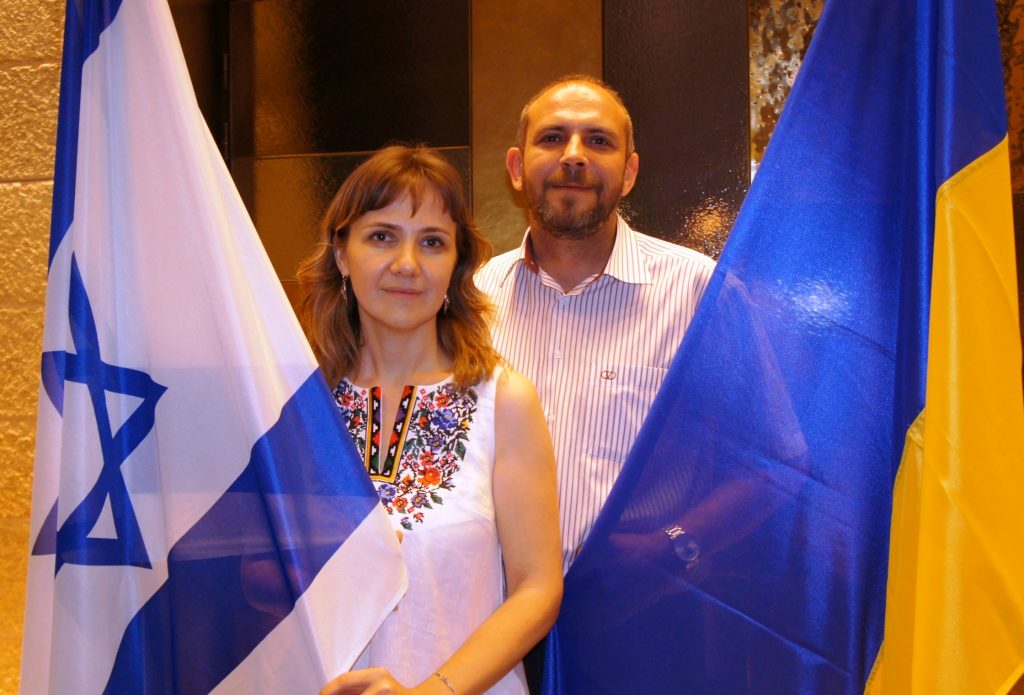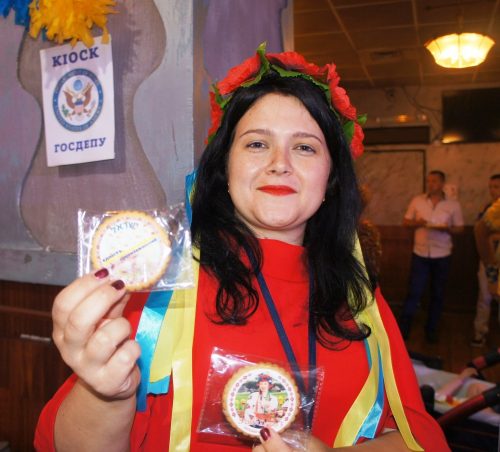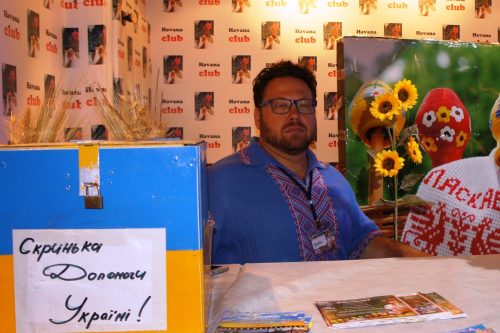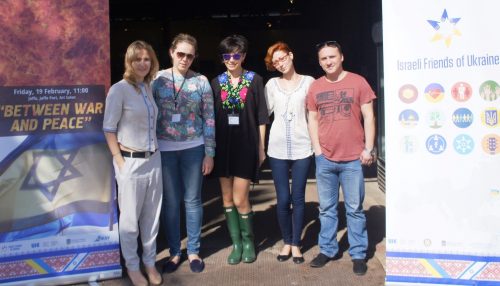What does Ukraine mean to Israelis born in Ukraine?
Ukraine aroused a much bigger interest among Israelis in 2014-2017 than in previous decades. The events of the Maidan in Kyiv, the crisis in Crimea, the military conflict in Donbas, as well as the achievements and failures of reforms in Ukraine became subjects for heated disputes in Israel. In this special report for the UJE, we surveyed different opinions on Ukraine among Israelis who have roots in Ukraine.

Several questions were asked:
“As a resident of Israel, what does today’s Ukraine mean to you?"
“What is your attitude to participating in pro-Ukrainian events and aid to Ukraine?"
"What do you like, and do not like, in today’s Ukraine?"
Vyacheslav Feldman (from Kremenchuk)
Ukraine is my homeland. It is a country in which I was born, grew up, and studied. My family and friends live there. The graves of my ancestors are there. And I heartily wish Ukraine becomes a modern and democratic country of which we will be proud, as we are proud of Israel. I participate in pro-Ukrainian events because I am not indifferent to what occurs there. Ukraine’s nature, food, and welcoming hospitality appeal to me. What is not pleasant for me is the indifference of many people to their own country, the unwillingness to change things, and corruption.
Ihor Amdur (from Kherson)
I am not indifferent to the destiny of the country in which I was born, and that of the people with whom I grew up. I do not like the corruption and the attitude of politicians towards the population, which kills all desire to do something for the country. What I like is that the people of Ukraine rose up in defense of the Homeland during the war, the work of volunteers over the three years of war with the Russian aggressor, and the patriotism of most of the population of Ukraine.
David Shekhter (from Odessa)
Odessa is a city in Ukraine in which my grandmothers were born and which is very important to me. What I like in Ukraine is its democracy and the readiness of the people to uphold it despite the difficulties.
Timur Mamedov (from Nadvirne, Ivano-Frankivsk region)
After repatriation my heart blossomed into two flowers—the flowers of Ukraine and those of the new home, the Land of Israel. I support Ukraine and its people in their difficult situation. I want to make my contribution to the creation of a “new” and better Ukraine. I like the pro-European outlook of the youth and the desire to discard the Soviet heritage. Excessive praise for the OUN-UPA and periodic outbursts by antisemites are not pleasant, although fortunately there are not a lot of them. I don’t like the complaints of some people about the so-called "Jewish power in Ukraine" as this does not correspond to the truth.
Inna Turbayevska (from Yuzhnoukrainsk, Mykolayiv region)
For me in Israel, Ukraine is the place of my childhood, which left me with the best memories and loyal friends. When the war in Ukraine began, I saw a very strong reaction by society, similar to what occurs in Israel during wars. I like that people began "to wake up" and understand that everything depends on them.
Shaul Reznik (from Lviv)
In 2014 there was the naive hope that good people after the Maidan would sweep the bad people from power and would finally triumph against evil. Alas, this didn't happen.
I like the pro-western orientation of young people, including those in my beloved Lviv. I like the vow to comply with standards and the success of the country—democracy, the fight against corruption, tolerance, and other western attributes that have nothing in common with "the Russian world.” I don’t like the fruitless search for some unique Ukrainian model of development with an emphasis on nationalism.
Tina Polyakovska (from Dnipro)
It is very nice for me to see more people speaking in Ukrainian in Ukraine. Unfortunately, some think that to be a Ukrainian in Ukraine today is to wear an embroidered shirt and to shout slogans in Ukrainian. But this isn't enough. It is sad for me to see how more and more people seek to leave, as they don't see a future in Ukraine.
Pavel Gelfand (from Kyiv)
I am myself half-Jewish and half-Ukrainian. My parents live in Ukraine. I like the spirit of mutual aid in modern Ukraine that is present in most people. What I don’t like is that corruption is not declining.
Lyubov Ivanova (from Lviv)
For me, as a resident of Israel, Ukraine is the country from where came most of the fighters for the rebirth of Israel—Bialik, Golda Meir, and Jabotinsky. History and family relations connect us. I want Ukraine to make use of the extensive experience of Israel’s development. I don’t like the military situation, the corruption, and "the remains" of the Soviet heritage in people. I like the activism of the youth and the national culture.
Ihor Gurevich (from Kharkiv; deputy of Nesher city council)
For me Ukraine is the past, which will remain with me for the rest of my life. A genetic memory, which is frightening to pass along to children. I like our schoolteacher of Ukrainian, melodious Ukrainian songs, the mellifluous Ukrainian language of visitors from Poltava, and Poltava smoked sausage with garlic. I don’t like the boorishness that was sometimes encountered.
Alexii Ostapenko (from Kyiv)
Ukraine is the country where I was born and lived the first twenty-four years of my life. I have a lot of friends and relatives there and when this country and people got into trouble, it was necessary to help. Some Ukrainians want to do everything necessary to live in a different way, in a European manner. But they, unfortunately, are a minority. There is corruption and irresponsibility.
Dmytro Kanter (from Kyiv; Channel 9 Television of Israel)
For me Ukraine is a country that I love, am proud of, and in which I believe. I participated in and am ready to continue to participate in pro-Ukrainian actions. I am delighted by the people in Ukraine who began to change for the better. I do not like the rotten system of corruption that makes life miserable and hampers the development of the country.
Anna Zharova (from Kherson, the head of Israeli Friends of Ukraine)
Today, after three years of volunteering, Ukraine for me is first of all people with whom we actively communicate, mutually help one another, and support. These are people who seek to change the present and the future.
I believe that Ukraine will be able to move onto the European path of development. I always hear about new initiatives, projects, and startups. We are creating an influential "lobby" for Israel in Ukraine, an international community of citizen diplomats from both parties, and we advance Israel in Ukraine as a strategic partner and friend.
I am glad that civil society has appeared in Ukraine! People take the initiative. But I don’t like the old system, which is stubbornly holding on. I am disturbed by the policy of the Ukrainian Institute of National Memory. I see the important purpose of educational seminars in the study of joint history, so that Ukrainians can begin to ask questions about who are their heroes.
Mila Margolina (from Kyiv)
Text and photos: Shimon Briman






















